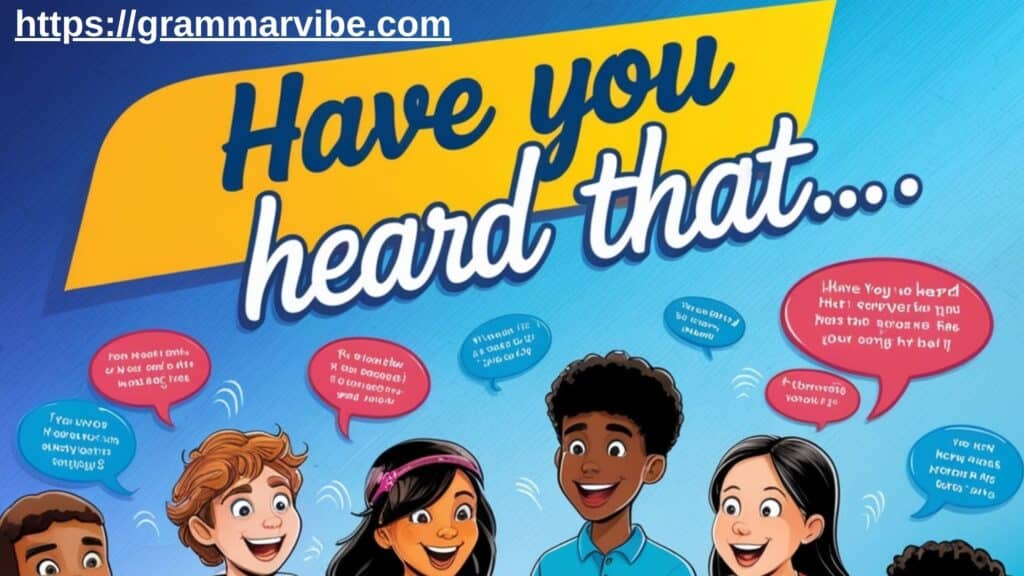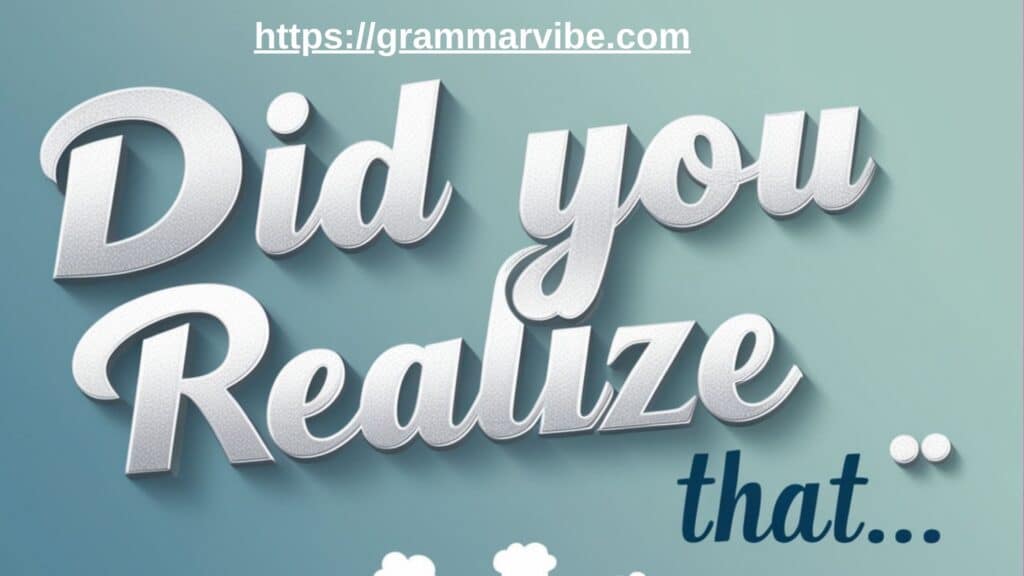Whether you’re a teacher, writer, or just someone who enjoys sharing interesting trivia, finding new ways to present facts can breathe life into your conversations and written content. The phrase “Did you know?” is a classic go-to for introducing fun facts or unexpected information. However, if you’re looking for alternatives to keep your communication fresh, this article offers you 15 engaging ways to say “Did you know.” These alternatives will add variety to your interactions, whether they are in professional communication, casual chats, or even formal settings.
Explore each phrase with a bit of flair, offering real-life scenarios and examples to help you get the most out of them!
1. Are You Aware That…?
This phrase adds a formal touch to your communication. It’s ideal when you’re sharing little-known facts or information sharing that might be surprising. When used appropriately, it conveys both respect and curiosity.
Scenario:
You might be speaking to a colleague about a recent achievement:
Email example:
“Hi John,
Are you aware that our project team achieved a 15% increase in productivity this quarter? It’s a great accomplishment that deserves recognition.”
By using “Are you aware that…” you can show admiration for the team’s success while also encouraging awareness of the accomplishment.
2. You Might Be Surprised to Learn That…
This phrase piques curiosity and sets the stage for unexpected trivia. It’s a wonderful way to introduce interesting facts that may defy expectations. It works particularly well in informal communication.
Scenario:
In a casual conversation with a friend:
Example:
“You might be surprised to learn that Sarah actually plays the violin! I had no idea she was such a skilled musician.”
This expression works best when you’re sharing something unexpected, and it invites the listener to be amazed or intrigued.
3. It’s a Little-Known Fact That…
This phrase works well for introducing obscure or surprising facts. It can add a sense of wonder or curiosity, which can help engage your audience. Perfect for conversation starters, this option works in both professional and informal contexts.
Scenario:
You’re sharing a fun fact during a team meeting:
Email example:
“It’s a little-known fact that 70% of the Earth’s oxygen is produced by the ocean’s plankton. I thought it was worth sharing!”
By using this phrase, you’re setting up a reflective tone that encourages deeper thought.
More for you: 15 Other Ways to Say “Please Advise”
4. Did It Ever Occur to You That…?
This phrase opens up a reflective tone, inviting the listener to think deeply. It’s often used when introducing something unexpected or new. You’re essentially asking someone to consider an idea they might not have thought about.
Scenario:
Imagine explaining a new work project to a colleague:
Example:
“Did it ever occur to you that a change in our office layout could actually improve overall productivity? It might be something to think about.”
This version gives a sense of insight into the conversation and encourages a thoughtful exchange.
5. Have You Heard That…?

This is a casual phrase ideal for informal settings or engaging conversations. It can introduce unexpected information or just serve as an interesting tidbit in a friendly exchange.
Scenario:
You’re talking to a friend about a celebrity’s recent accomplishment:
Example:
“Have you heard that Emma Stone is launching a charity for mental health awareness? It’s really inspiring how she’s using her platform for good.”
This conversational approach feels friendly and approachable while still sharing insight.
6. Were You Conscious of the Fact That…?
This one’s a bit more formal and is great when you want to introduce information that is less common but still valuable. It suggests a sense of recognition for information the listener might have overlooked.
Scenario:
You’re introducing positive recognition in a formal setting:
Email example:
“Were you conscious of the fact that our client, Samantha, has recommended our services to three new companies this month? It’s impressive how well she advocates for our work.”
This phrasing works well in professional communication, offering a chance to express pride or admiration.
For your interest: 15 Other Ways to Say “Great Asset to the Team”
7. You May Not Realize It, But…
A phrase like this is perfect when you’re about to reveal something that might be hidden or overlooked. It invites the listener to reflect on something they might not have been aware of, creating a sense of surprise.
Scenario:
You want to give positive recognition to a colleague:
Example:
“You may not realize it, but Rachel has been working late every night to make sure the presentation is perfect. Her commitment is really paying off.”
This phrase works well when you’re sharing personal accomplishments that deserve appreciation but might not be immediately visible.
8. Believe It or Not…
This phrase suggests a sense of wonder and amazement. It’s great for sharing particularly surprising or hard-to-believe trivia. Use it when you want to emphasize how impressive or out-of-the-ordinary the information is.
Scenario:
You’re chatting with a friend about a quirky fact:
Example:
“Believe it or not, dolphins have been known to recognize themselves in mirrors. It’s fascinating how advanced their self-awareness is.”
This phrase introduces unexpected trivia, and the positive tone adds a sense of lightness to the conversation.
9. Interestingly Enough…
“Interestingly enough…” is a phrase that signals curiosity and intrigue. It invites the listener to hear something unique, and it suggests that the information you’re about to share is not just surprising, but also intriguing.
Scenario:
You’re talking to a colleague about a recent discovery:
Example:
“Interestingly enough, our company has been the first to implement a zero-waste program in our industry. It’s a huge achievement!”
By using this phrase, you highlight the uniqueness of the information, making it sound even more valuable.
You might also like: 15 Other Ways to Say “You As Well”
10. It May Interest You to Know That…
This formal phrase is used when you want to share information that is relevant and likely to capture the listener’s attention. It works particularly well in professional settings when you’re sharing achievements or recognition.
Scenario:
You’re talking to your boss about a team success:
Email example:
“It may interest you to know that the marketing team has increased engagement by 20% over the last quarter. It’s a real testament to their effort.”
This phrase helps express gratitude and pride in a formal, respectful manner.
11. Did You Realize That…?

“Did you realize that…” is an invitation to discover something previously unknown, often adding a reflective tone to the conversation. It suggests that the information might have slipped by unnoticed but is worth acknowledging now.
Scenario:
In a discussion about an employee’s contributions:
Example:
“Did you realize that Kyle has been working tirelessly behind the scenes on the new software update? His dedication is impressive.”
This phrase allows you to acknowledge someone’s work, ensuring they feel recognized for their efforts.
12. Have You Ever Thought About…?
This is a great way to engage someone in an informal conversation, encouraging them to reflect on something they might not have considered before. It works well for intriguing ideas or unexpected information.
Scenario:
Talking to a friend about an unexpected achievement:
Example:
“Have you ever thought about how much time the average person spends on their phone? It’s wild how much technology is shaping our daily lives.”
This phrasing is a great way to introduce something surprising while encouraging thoughtful reflection.
13. Ever Wondered If…?
This phrase is perfect for introducing surprising facts or trivia that might spark someone’s curiosity. It’s a fun, lighthearted way to prompt an engaging conversation.
Scenario:
A casual conversation with a colleague:
Example:
“Ever wondered if cats actually understand us when we talk to them? Turns out, they do respond to our tones!”
It’s a fun fact that leads to more engaging dialogue and invites your listener to share their thoughts.
Check out this: 15 Other Ways to Say “How Much”
14. Guess What…?
“Guess what…” is an informal, playful way to introduce something exciting or surprising. It’s often used when you want to add a bit of drama or anticipation before sharing your fun fact.
Scenario:
A chat with a friend about something they’ll find fascinating:
Example:
“Guess what? I just found out that chocolate was once used as currency by the ancient Mayans!”
This phrase creates anticipation, making it a great option when you want to keep your audience hooked.
15. Just So You Know…
While not as formal, “just so you know…” can be used to casually share interesting facts or unexpected news. It’s perfect for a quick tidbit that doesn’t require a lot of buildup.
Scenario:
Telling a colleague about an office achievement:
Example:
“Just so you know, the IT department fixed that bug in the system that’s been causing issues all week. It should be working perfectly now!”
This straightforward approach works well for keeping communication clear while still sharing valuable information.
Table: Synonyms for “Did You Know?”
| Phrase | Context |
|---|---|
| Are you aware that…? | Formal, informational |
| You might be surprised to learn that… | Casual, engaging |
| It’s a little-known fact that… | Informative, intriguing |
| Did it ever occur to you that…? | Reflective, thought-provoking |
| Have you heard that…? | Casual, conversational |
| Were you conscious of the fact that…? | Formal, respectful |
| You may not realize it, but… | Surprising, enlightening |
| Believe it or not… | Informal, amazing |
| Interestingly enough… | Informal, intriguing |
| It may interest you to know that… | Formal, insightful |
| Did you realize that…? | Reflective, recognition |
| Have you ever thought about…? | Casual, thought-provoking |
| Ever wondered if…? | Fun, casual |
| Guess what…? | Playful, informal |
| Just so you know… | Informal, direct |
Conclusion
Using different ways to say “Did you know” can make your conversations more fun and interesting. Whether it’s a casual chat or a professional email, these alternatives help keep your message fresh. They also spark curiosity and make your communication more engaging.
Switching up your phrases can be a great way to express surprise, admiration, or share little-known facts. Try these alternatives to keep your audience interested and informed in both personal and professional settings.

Kyren Paul is an experienced blogger and the creative mind behind “Grammar Vibe.” With a passion for the nuances of English grammar, he brings clarity and insight to everyday language topics, making grammar accessible and engaging for readers of all levels.











Leave a Comment